This article originally appeared on the Pragmatic Institute website and can be accessed here: Why People in Product Quit their Jobs
by Ginny Nelson, Director, Executive Search at Gibson Consultants
 Why does turnover matter?
Why does turnover matter?
Throughout the pandemic, the candidate market was unlike anything our firm had seen in over 20 years of recruiting. “The great resignation” meant that our recruiters had to reach out to twice the number of candidates twice as many times to submit the same number of qualified candidates to our clients. As a result, getting to the bottom of what our candidates care about the most in a job became a huge topic of conversation with our clients.
To take it a step further, many companies became desperate to retain existing talent. If you can get to the bottom of why your employees are leaving and take steps to mitigate that, you can save your company a lot of time and money. Backfilling a role isn’t cheap, so let’s talk about mitigating turnover and jumping into the results.
Table of Contents
- Survey Methodology
- Across all levels, why do people in product leave their jobs?
- How does company culture impact product management professionals?
- What does room for growth mean in product? And why does it matter?
- How important is remote work to product professionals?
- Why else are product professionals leaving their jobs?
- Three reasons why C-Level product professionals are likely leaving their jobs
- How culture affects the VP Role
- Why are directors the least likely to leave the industry?
- Why are product managers the most likely to be laid off?
- What are the biggest takeaways from this study?
Survey Methodology
Background
As an executive recruiter focused exclusively on product management, I was interested to see how this data would compare to the thousands of individuals I’ve spoken to in product about their careers. I also wanted to assess how the responses differed based on someone’s organizational level.
Why are people leaving your team? What’s your turnover rate? To understand why people in product are changing jobs, I surveyed 76 people in product management at all levels, ranging from product managers to Chief Product Officers. An employee typically leaves a job for many reasons, but my goal was to determine the top driving force for turnover among product management professionals.
Who are the participants?
Because titles vary from organization to organization, I divided the participants’ levels into four categories: C-level, VP and/or department head, director and manager.
The participants were fairly evenly distributed by level, with 25% being c-level, 28% being VP or department head, 25% being director-level and 22% being manager-level. Because my focus is healthcare technology or “digital health,” most of the participants are in that industry.
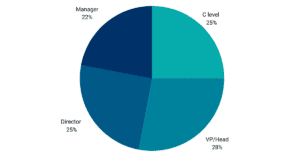
Across all levels, why do people in product leave their jobs?
Overview of total responses:
The most common response for leaving a previous job across participants of all levels was as follows: poor company culture (20%), followed by lack of room or advancement/growth (17%), and change in company dynamic due to a merger or acquisition (17%). This aligns well with my conversations, but let’s dive deeper into why.
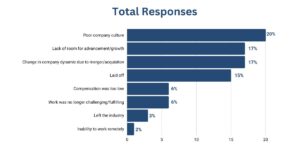
How does company culture impact product management professionals?
With company culture being the top answer chosen across all participants (20%), it’s important to ask ourselves, what does a positive company culture truly mean for my team?
Common explanations people gave when explaining this response were:
- Poor leadership/micromanagement
- Leadership didn’t align with the vision for the products
- Leadership being uninformed on the market
- Unrealistic expectations and being “stretched too thin”
The common trend? Poor leadership. Finding the balance between ensuring your team is successful and giving them the freedom to do so is far more art than science but vital to ensuring the retention and satisfaction of your employees.
While certain themes might be transferable to most organizations, good company culture is not a one size fits all concept. For example, a positive company culture for a non-profit, ed-tech start-up with ten employees is likely different from a publicly traded, fortune-500 fintech company that’s been around for two decades.
Have you considered what a positive company culture would look like for your team? It’s an essential aspect of creating a productive and fulfilling work environment. Identifying the specific characteristics of a great company culture can help you shape your team’s ideal workplace environment.
Start by considering what makes a bad company culture, and work from there. Knowing what to avoid can help shape a healthy, nurturing work environment. Once you understand what to avoid, think about what your team needs to thrive.
Perhaps your team would benefit from a supportive, collaborative environment with abundant resources and training opportunities. Or maybe your team values independence, autonomy, and the freedom to make decisions.
Taking a step back and having an honest conversation about where your company culture is today is the best way to determine if your employees want to work at your company and see themselves there long-term.
What does room for growth mean in product? And why does it matter?
17% of all participants left their previous company due to a lack of room for advancement or growth, and I’m not surprised. This was also one of the most common answers for c-level, at 26%. The higher you climb the seniority ladder, the more difficult it becomes to get to the next step. Once you’re a Chief Product Officer, it may take years to get to the next step as a CEO or even COO.
Advancement rate
What I found intriguing is that the popularity of expecting quick promotions drops among senior-level positions but resurfaces with manager-level positions, where 20% still anticipate fast advancement. As the newer generations enter the workforce, there’s no denying that instant gratification might affect Gen Z’s practical expectations when climbing the corporate ladder. This is also true for millennials. I often speak to younger product professionals who anticipate swift progress in their careers, and if they don’t get it, they may start looking elsewhere.
Although it’s not an ideal scenario, it’s the reality we face. We can either wait and hope for the problem to disappear or adapt and find a way forward. If you have a valuable employee who you want to keep, but promoting them isn’t feasible at the moment, consider establishing a set of objectives they can work toward to progress to the next level.
Organizational size
Another possible explanation for why a lack of opportunity for advancement or growth is a driving force for product managers leaving their companies is the typical size of a digital health company. While significant market consolidation has been throughout the pandemic, most digital health companies are still start-ups to small growth organizations.
As a result, these smaller companies often have relatively flat organizational structures. Getting to the director level may not feel like an option for a while because it may take time and additional funding before a company can build that tier of leadership into its organization. Many of the product managers I’ve spoken with have said their career path has felt uncertain, and often the timeline of when that middle tier would come gets pushed out. So, what do they do? Look elsewhere.
Individual contributor track
Sometimes, however, product managers don’t want to take the leadership route but become stir-crazy with staying in the same role for 10+ years with no room for growth. Creating a hierarchy for an individual contributor should look different from someone who wants to move into leadership roles.
Maybe the hierarchy for growth for the individual contributor product manager means taking on a larger portfolio of products to manage, being invited to more conversations with the executive team, being given more of a voice during the ideation process, or even simply earning a monetary bonus after achieving certain goals.
The product managers I speak with who know they’re on a path to moving up to the next level and are gradually given more autonomy and influence tend to be far more satisfied in their roles than those who feel stagnant.
Redefining what it means to grow within a company means making ladders within ladders so that your employees can see progress, even if it’s not a new title.
How important is remote work to product professionals?
I was surprised that the inability to work remotely only accounted for 1% of total results. On the outside looking in, many may assume that the ability to work remotely may not be as important to candidates as some may think.
I, however, would argue this is because the vast majority of product candidates that I talk to are already fully remote, aside from some occasional travel. Therefore, remote work may be a large factor when choosing a new job but may not be the driving force for leaving a job since it is typically the “standard.” This may, however, be specific to my industry, since nearly everyone I talk to is in healthcare technology, where remote work was the norm for product management roles even before the pandemic.
Why else are product managers leaving their jobs?
Three reasons why C-Level product professionals are likely leaving their jobs
The distribution of answers from the c-suite was especially interesting to me. The top answers tied for 26% of c-level respondents were a “lack of room for growth/advancement” and “change in company dynamic due to merger/acquisition.”
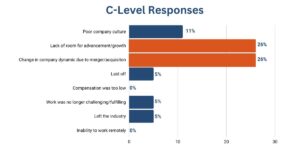
Reason 1: M&As
Leaving a previous job because of a change in company dynamic due to mergers and acquisitions was a more common driving force for leaving at the c-level, compared to more junior product professionals. It makes sense that when a company merges, there will only be so many executive roles, and some may be eliminated.
Also, when a company merges or acquires another, the c-suite likely feels the stress of that change the most since they’re calling the shots.
Reason 2: Compensation:
Another surprise for the c-suite responses was that not a single candidate chose compensation as their driving force for leaving a company. When talking to chief product officers, most do not say compensation is a driving force for them, but it is still typically a factor. Many CPOs are in the later stages of their career and might have a few kids in college, a mortgage, etc. While I expected this response to be lower, I did not expect it to be 0%.
One possible explanation is that most c-suite executives have a higher variable income (i.e., equity, stock, or bonus). Most chief product officers who I talk to care less about the base salary because they often make more money in the variable compensation. As a result, their driving force for leaving a role might be the overall vision for the company’s future success.
Another explanation for this is that c-suite executives are typically further along in their careers and may therefore have higher financial stability than a product manager. As a result, compensation may be a factor when choosing a new job, but it is not the driving force for leaving an existing role.
Reason 3: Another Possible Reason
Additionally, a common explanation for people gave who did not select one of the provided answers was that they either retired or left to start their own company, two explanations that I did not see at the other levels measured in this study.
How culture affects the VP Role
When looking at the responses from the VP/Head-level respondents, it is clear that company culture continues to affect one’s ability to retain employees at all levels of an organization. Without a positive work environment, a large portion of your employees will likely start looking for a new job.
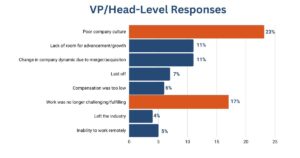
Why are directors the least likely to leave the industry?
Company culture remains at the top for director-level product candidates; however, I found it interesting that 0% of these respondents left their previous job due to leaving the industry altogether.
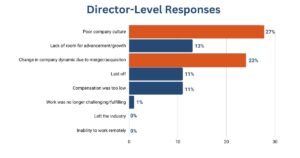
Perhaps this is because once you reach the director level of product management, you’ve reached a sweet spot. You’ve likely been in the industry for a few years, but you’re just starting to get your hands dirty and make a greater impact in an organization. Also, you’ve likely started taking on more influential leadership roles.
Once you’ve reached the director level in product management, changing industries often requires taking a step back in level. A company is less likely to put you in a leadership role if you’re completely new to the industry. At the manager level, however, most individuals I’ve spoken to have an easier time making a lateral move, even if it’s in a different industry. Again, this may be an observation specific to healthcare technology since it is an increasingly complex industry.
Why are product managers the most likely to be laid off?
You’ll notice that being laid off was the most common response for manager-level product respondents at 32%, despite it accounting for a relatively low number of responses for the remaining levels of those surveyed.
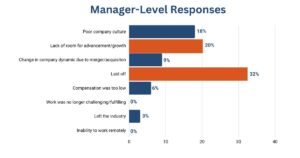
While in other industries, this may be logical since we just experienced the great resignation through the pandemic, healthcare technology has been booming during this time. I have seen a slight increase in layoffs lately due to the recession, but I did not expect it to be as high as 32% for managers, especially compared to the responses from the other levels.
One explanation might be that when shifting to a fully remote workforce during the pandemic, companies often did some restructuring, which could have meant eliminating more product managers than some of their more senior team members.
What are the biggest takeaways from this study?
1. Company culture matters and leadership is the driving force in creating a positive company culture.
Ensuring that you have strong leadership can be challenging, but there are steps you can take to increase your chances of success. One practical approach is to thoroughly vet leadership candidates by asking pointed questions about their leadership style and requesting real-life examples of how they’ve tackled leadership challenges in the past.
Another helpful technique is to have the leader’s potential subordinates interview the candidate to gauge how well they will mesh with the team.
Finally, conducting comprehensive reference checks with the candidate’s former subordinates can help you gain a more accurate and holistic understanding of their leadership abilities.
2. Retrain your product employees by creating advancement ladders within hierarchy ladders
Creating a vision for a hierarchy of growth for your employees is one thing, but communicating that vision effectively is another. When employees know they’re working toward an end goal to grow in their career, they’re more likely to have high job satisfaction and stick around longer. Employees are more likely to be engaged and push themselves to achieve loftier goals when they enjoy where they work.
A “checked out” employee is less likely to be the one coming up with creative and innovative ideas. Creating an environment for growth allows employees to also have an environment of excitement and collaboration. This means redefining what it means to grow within a company. It’s all about making ladders within ladders so that your employees can see progress, even if it’s not a new title.
3. Lastly, mergers and acquisitions will likely always threaten the technology employment landscape.
Change is inevitable if you plan on entering a merger or acquisition. Rather than telling your employees that things won’t change, start thinking about ways to prime your company best to handle that change gracefully.
About the Author
Ginny Nelson is the Director of Executive Search for Product Management at Gibson Consultants, an executive search firm that has been recruiting healthcare professionals since 2002. She partners with digital health companies to help them attract, recruit, and retain product management talent from mid-management to the C-Suite. You can email Ginny at ginny@gibson-consultants.com or connect with her on LinkedIn: https://www.linkedin.com/in/ginnynelson/.
Are you preparing to interview for a product position? Check out our Comprehensive Guide to Ace a Product Manager Interview
Why Pragmatic Training Can Help You Retain the Your Product Employees
Product professionals stick around when they feel they have the skills and knowledge to do their job well. Specialized training through Pragmatic Institute will help your employees better understand their roles and responsibilities in product development. With the knowledge they gain, your employees will be better positioned to navigate change and more effectively execute their tasks. Learn more about how Pragmatic Institute can help your team reach its goals.


Leave a Reply